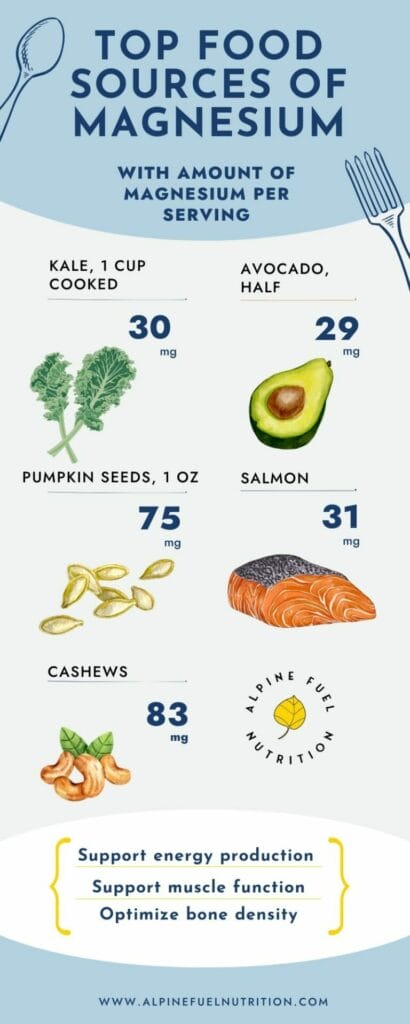

I was training for a 16-mile trail race, and my legs constantly felt heavy and tight during my runs, like taut rubber bands with weights attached to them. The feeling persisted no matter how much foam rolling and stretching I did. Needless to say, after several weeks of feeling this way, I was frustrated!
I tried changing my pre-run and intra-run nutrition and practiced several mobility techniques to no avail. Then, one day, it dawned on me that I might be low on a key mineral necessary for performance and recovery from endurance exercise – magnesium!
I began increasing my intake of magnesium-rich foods and incorporated a small amount of supplemental magnesium, and I immediately began to feel better! My legs no longer felt heavy while running, and the chronic muscle stiffness and tightness began to resolve.
I’m NOT saying magnesium is a magic bullet, but in my case, it definitely made a positive difference.
There are few minerals more important than magnesium for endurance athletes. However, a shocking 52% of the U.S. population fails to meet the daily requirement for magnesium, and endurance athletes may be at an even greater risk of magnesium deficiency due to magnesium losses through intense exercise and sweat. (Source, Source)
When endurance athletes fail to maintain an optimal magnesium status, they may struggle with various symptoms, including but not limited to fatigue, muscle cramps, muscle tightness, and sleep difficulties.
In this article, I’ll dive deep into the importance of magnesium for endurance athletes, including the top food sources of magnesium and how to select a magnesium supplement.
Please note that I am an affiliate for some of the products I’ve linked to in this post. If you click the link here and make a purchase, I may earn a commission at no extra cost to you.

Magnesium is an essential mineral necessary for at least 600 biochemical reactions inside the body, including cellular energy production, maintenance of bone density, muscle contraction and relaxation, blood pressure regulation, hormone balance, and mental health. (Source)
Dietary magnesium insufficiency or deficiency is linked to fatigue, high blood pressure, low bone density, muscle cramping, anxiety, and sleep difficulties. (Source)
The Recommended Dietary Allowance (RDA) for magnesium is 400-420 mg daily for men and 310-320 mg for women. However, some people may need more magnesium than the RDA to achieve optimal health, including endurance athletes.
Top dietary sources of magnesium (and some ideas for ways to consume them) include:
If you’re unsure how much magnesium you consume through your diet, you should track your food in an app, such as the Cronometer food tracking app, for several days. This is a great, DIY way to assess how much magnesium you’re consuming through food and determine whether you need to get more of this mineral.

If you are an endurance athlete, it is crucial that you optimize your magnesium intake and the level of this nutrient in your body. Let’s discuss the potential causes of low magnesium in endurance athletes, signs to watch out for that indicate a potentially low magnesium level, and how to test your magnesium level.
Besides not eating enough dietary magnesium, conditions that may contribute to magnesium insufficiency or deficiency include:
Potential signs of low magnesium levels in athletes include:
One way to assess whether you need more magnesium is to ask your doctor or healthcare provider for a magnesium blood test. A serum magnesium test measures the amount of magnesium in your blood. If you have a low serum magnesium level, this may indicate a need to increase your dietary magnesium intake.
However, the serum magnesium test isn’t perfect. Only 1% of magnesium is present in the serum/bloodstream; the remaining 99% of magnesium inside your body is distributed between bone and inside your cells. Therefore, a serum magnesium test definitely has its shortcomings and is unlikely to identify many cases of magnesium insufficiency. (Source)
There is an alternative to a serum magnesium test called a “magnesium loading test.” This test must be done in a medical setting and involves receiving an infusion of magnesium; urine is then collected over a period of at least several hours. The amount of magnesium in the urine and the amount retained by the body are measured to assess magnesium sufficiency. However, this test is not accessible to most and thus impractical. (Source)
A red blood cell (RBC) magnesium test is another potential way to measure magnesium. However, it is not considered a reliable test at present and may offer little more value than a serum magnesium test.
If you are an endurance athlete and your serum magnesium test is normal, but you are still struggling with symptoms of magnesium deficiency, it may still be worthwhile to work on increasing your dietary magnesium intake.
I highly recommend working with a qualified healthcare professional, such as a sports nutritionist, who can help you create a plan to increase your dietary magnesium intake.
Magnesium plays several vital roles in the health and performance of endurance athletes, such as trail runners, mountain bikers, and mountaineers. It supports energy production, normal nerve and muscle function, bone health, blood sugar regulation, sleep, and mental health. Let’s discuss the six health and performance benefits of magnesium for endurance athletes in turn.
Magnesium is used by your mitochondria, the energy powerhouses of your cells, to make ATP. ATP is your body’s cellular energy “currency,” used to fuel nearly every physiological function inside your body. For example, inside your muscles, ATP is broken down to fuel muscular contraction.
By impairing ATP synthesis and cellular energy production, a suboptimal magnesium level could compromise the function of numerous body systems, driving fatigue and compromised exercise performance.
Our nerves and muscles work together (their combined efforts are called “neuromuscular” activity) to power physical activity, including endurance exercise. Magnesium plays role in nerve and muscle function (for example, it is needed to make ATP, as discussed above). Magnesium deficiency may thus result in impaired neuromuscular function, including neuromuscular fatigue during exercise, muscle cramps, and stiff or sore muscles. (Source, Source)
Magnesium is also vital for muscle recovery after exercise. Research in cyclists indicates that magnesium supplementation at 400 mg per day exerts a protective effect against muscle damage after a demanding endurance effort, possibly by inhibiting the production of excessive free radicals during exercise. (Source)
Free radicals (recall biology class!) are molecules with unpaired electrons that like to “steal” electrons from other molecules, causing damage. Inhibiting excessive free radical production can help protect healthy physiological function.
Healthy bones are vital for your longevity as an endurance athlete. Some research suggests that endurance athletes are more prone to low bone mineral density (BMD), so it is essential that you proactively care for your bones. Optimizing your magnesium intake may be one way to care for your bones and avoid future problems such as low bone density and bone stress injuries. (Source)
Bones store about 60% of the body’s total magnesium, where this mineral functions as a vital structural component of bones. Low serum magnesium levels are associated with low bone density in women, and high dietary magnesium intake is associated with a reduced risk of osteoporotic fractures. (Source, Source)
Low magnesium status may also harm the bones by increasing levels of inflammatory immune signaling molecules, which can degrade bone tissue. (Source)
“Balanced blood sugar” refers to blood sugar that stays relatively stable throughout the day and night, rising and falling gently around meals and rarely experiencing steep spikes and drops in blood sugar.
Maintaining balanced blood sugar supports stable energy levels during daily life and exercise sessions, a healthy mood, and keeps inflammation in check. These factors are vital to our health and performance as endurance athletes, so maintaining balanced blood sugar should be one of our top nutrition priorities.
You can learn more about how to build a diet that supports healthy blood sugar control and athletic performance as an endurance athlete in my blogs about nutrition for trail runners, mountain bikers, and mountaineers!
Magnesium plays multiple roles in regulating blood sugar. It optimizes the production of insulin, the hormone that ushers glucose into our cells. It also increases the sensitivity of our cells to insulin, helping them take up glucose without necessitating large amounts of insulin. (Source, Source)
Getting an optimal amount of sound, restorative sleep nightly is vital for your health and performance as an endurance athlete. During sleep, your body recovers from exercise, not to mention all of the other demands of the day.
Research indicates that a lack of sleep or poor quality sleep impairs the body’s regulation of metabolic and inflammatory processes, compromising the body’s ability to repair tissues damaged during exercise. (Source)
If you struggle with sleep, magnesium may be a helpful tool for you! Research suggests a higher magnesium intake is associated with better sleep quality and an ideal sleep duration. Magnesium may support sleep by promoting the synthesis of calming neurotransmitters. (Source)
Consuming magnesium-rich foods (or a magnesium supplement – see the section below for details) in the evening may help you fall asleep more quickly and experience deeper, sounder sleep.
To support sleep, I actually prefer topical magnesium over oral magnesium supplements. Topical magnesium is absorbed through the skin and can offer a rapid soothing effect on the body. Topical magnesium can be used as magnesium bath salts in a relaxing bath or topical magnesium lotion.
Mental health struggles are unfortunately pervasive both in the general population and in athletes. When mental health isn’t in a good place, it is hard to perform your best as an endurance athlete and function well in your daily life.
Magnesium may be one tool, alongside other critical mental health strategies, such as working with a licensed therapist and engaging in daily stress management practices, that can support mental health. (Source, Source)
Research shows that optimizing one’s magnesium level may help support a healthy mood. Magnesium may support mental health by regulating the hypothalamic-pituitary-adrenal (HPA) axis, the body’s stress response system. Magnesium may also modulate levels of serotonin, the “feel good” neurotransmitter that supports a healthy mood. (Source, Source, Source)
Some endurance athletes may have difficulty consuming enough magnesium through whole foods. In this case, magnesium supplementation may be helpful. Ideal forms of supplemental magnesium for endurance athletes include magnesium glycinate and magnesium malate.
Before trying a magnesium supplement, you must consult with a healthcare provider to determine whether a magnesium supplement is right for you and, if so, to determine your optimal dosage. Magnesium supplementation is typically not appropriate for people with cardiovascular or kidney issues, and it may conflict with some medications.
I DON’T advise supplementing with more than approximately 400 mg of magnesium daily. It is possible to consume too much supplemental magnesium; excessive supplemental magnesium could have adverse effects on the cardiovascular system and kidneys.
Magnesium plays a crucial role in the health and performance of endurance athletes. The more endurance athletes push their bodies, the more magnesium they may need, possibly above and beyond the magnesium RDA. Optimizing your magnesium intake may help you reach peak performance, maintain healthy muscles and bones, sleep well, and maintain a balanced mood.
To ensure optimal magnesium intake, athletes should maintain a balanced diet that includes magnesium-rich foods like leafy greens, nuts, seeds, and seafood. Magnesium supplements can be a valuable tool for endurance athletes who struggle to meet their daily requirements through diet alone, but athletes should consult with a healthcare professional to determine the appropriate dosage and form of supplementation.
Regular monitoring of magnesium levels and adjusting intake accordingly can help athletes maintain their health and improve their endurance performance.
If you need help optimizing your nutrition as an endurance athlete, I’d love to help you! I’m currently taking on new clients in my nutrition practice. If you are ready to dial in your nutrition to feel and perform your best in your daily life and your sport, schedule a complimentary discovery call with me to learn how I can help!
Would you like a super convenient, easy-to-read, PDF version of this comprehensive blog? Grab your PDF copy of 6 Health and Performance Benefits of Magnesium for Endurance Athletes!
The content provided on this nutrition blog is intended for informational and educational purposes only. It is not a substitute for professional medical advice, diagnosis, or treatment. Always seek the advice of your physician or other qualified health provider with any questions you may have regarding a medical condition. Never disregard professional medical advice or delay seeking it because of something you have read on this blog.
The information and recommendations presented here are based on general nutrition principles and may not be suitable for everyone. Individual dietary needs and health concerns vary, and what works for one person may not be appropriate for another.
I make every effort to provide accurate and up-to-date information, but the field of nutrition is constantly evolving, and new research may impact dietary recommendations. Therefore, I cannot guarantee the accuracy or completeness of the information presented on this blog.
If you have specific dietary or health concerns, please consult a qualified nutritionist or another healthcare professional for personalized guidance.
I empower others through nutrition to conquer their mountain adventures, drawing from my own experiences.
With a background in Biomedical Science and an M.S. in Human Nutrition, I’m a Certified Nutrition Specialist and Licensed Dietitian Nutritionist. My journey in functional medicine has equipped me to work alongside athletes and tackle complex health cases. As a passionate trail runner, backcountry skier, and backpacker, I strive to support others on their paths to peak performance and well-being.









Sign up for updates that come right to your inbox.